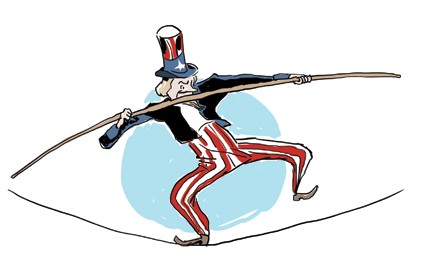Hardship in retaining leadership
- By Shen Dingli
 0 Comment(s)
0 Comment(s) Print
Print E-mail
China.org.cn, August 2, 2011
E-mail
China.org.cn, August 2, 2011
|
|
|
[By Liu Rui/Global Times] |
U.S. Secretary of State Hillary Clinton has just ended her grand Eurasian tour with stops in Hong Kong and Shenzhen. Exhaustive as the trip was, Clinton delivered a number of messages on maintaining regional prosperity and international order.
Her visit to Hong Kong and Shenzhen bore particular significance as she commended the Hong Kong system, which assures its "open, free, transparent and fair" development. The secretary needed to showcase Hong Kong's success as a model as part of her political agenda for the trip. She also had to assure Asia-Pacific nations that the U.S. regional partners ought not to worry about U.S. domestic political infighting, which has threatened for a while the prospects that the U.S. will repay its national debt on time.
Secretary Clinton's Shenzhen visit continued her pattern of talking maritime business on the sideline of one of her recent East Asian tours. In late October last year, she met her Chinese counterparts at Sanya airport to discuss the Sino-Japanese maritime dispute last fall, among some other issues. This time in Shenzhen, she met with her Chinese interlocutor to discuss the South China Sea.
Two major issues face the two nations: Will the U.S. honor its commitment to repay its Treasury debt and avert another financial crisis? And given the U.S.'s increasing difficulty in balancing its federal budget, how might it cope with the rise of Asian maritime powers, including China?
Finance and navy are the major tools and strength of the U.S. hegemony. The U.S. navy was established to protect its sea lanes – crucial to trade – which in turn injected more resources for further naval development. As a maritime state, America has grown through overseas trade, and therefore has a vested interest in protecting freedom of navigation.
Chinese maritime interests increasingly converge with those of America, but not completely. China also supports the freedom of navigation, and Beijing has never hindered such rights in the South China Sea beyond its exclusive economic zone. The two countries differ in the rights within China's coastal exclusive economic zone, but have largely managed to avoid physical collisions, except the incident of April 1, 2001 when China's J8-2 jet-fighter collided with the US EP3 reconnaissance airplane.
To build confidence between Beijing and Washington, it would be desirable to assure the U.S. that the Chinese interpretation of the US Convention on the Law of the Sea (UNCLOS) with regard to rights of navigation would not extend to parts of the South China Sea outside China's exclusive economic zones. China may have a right to economic use of those areas, but would not view any other ships' passage there as "unpeaceful".
The US seems upset in seeing the difference with China on the navigation freedom within Chinese exclusive economic zone, without noticing that its right outside the exclusive economic zone is never challenged. In the context of challenging China's sovereignty by selling weapons to Taiwan, the US needs to reflect how its surveillance on China from within China's exclusive economic zone would be viewed by China as "unpeaceful".
What really challenges the U.S. is neither China's difference with America on U.S. military surveillance from within China's exclusive economic zone, nor its political infighting on raising its debt limit. As the number one economy in the world with a population of only 300 millions people, the U.S. ought to have enough means to repay its debt.
What seriously harms America is its sustained failure to put its financial house in order. Overspending, from the government to the people, has generated ever-rising public and private debt. While some additional budgeting is necessary for social welfare, it is hard to justify spending US$685 billion a year presently on the military. It is really hard to comprehend why, at a time when the government has no money to spend extra and needs to repay debt without borrowing more money, America needs an Africa Command.
The U.S. is mired in a financial trap it has dug itself. President Bill Clinton once turned the huge budget deficits his predecessors left to surpluses. Then President George W. Bush turned such surpluses into even bigger deficits, and President Obama has added even more debts. Asking for a higher debt ceiling without figuring out how to cut spending is merely delaying the disaster and ensuring its eventual explosion is even more forceful.
Retaining America's leadership in Asia depends on the U.S. innovation – spending less, saving more and reducing the debt. Other countries could help by importing and spending more, as their trade surplus with the U.S. contributed to U.S. borrowing. A prosperous Asia Pacific has to be built through collaborative effort.
The author is a columnist with China.org.cn. For more information please visit http://www.ccgp-fushun.com/opinion/shendingli.htm
Opinion articles reflect the views of their authors, not necessarily those of China.org.cn.






